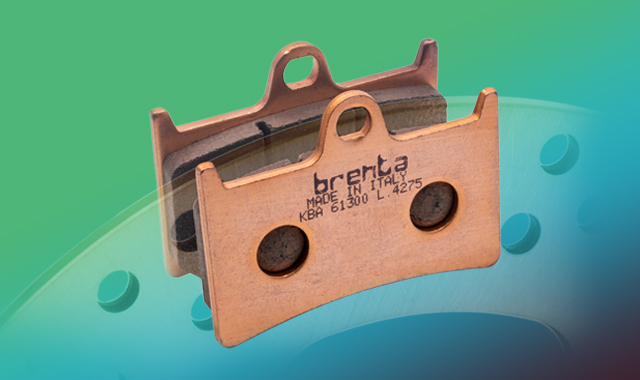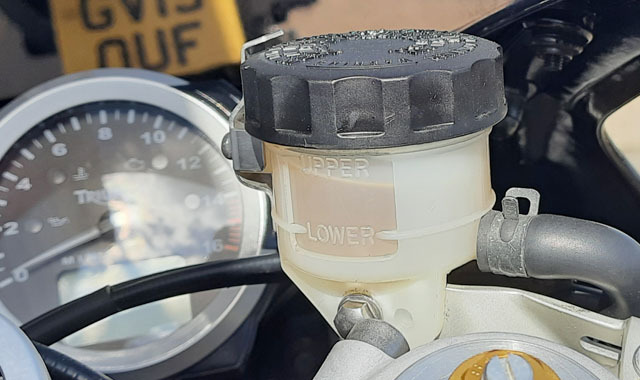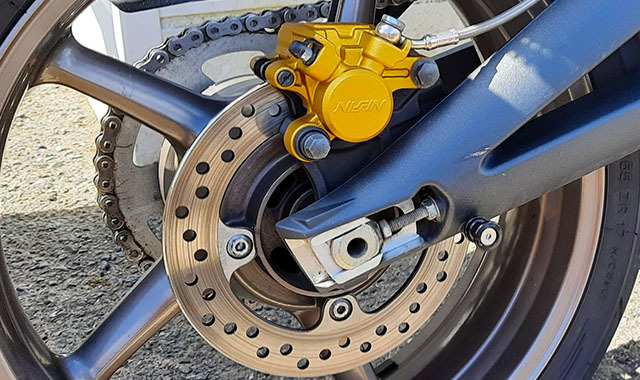B.O.L.T.S - HOW TO CHECK BRAKES

HOW TO CHECK:
BRAKES - COOLANT - LUBRICANTS - LIGHTS - STEERING - SUSPENSION - TRANSMISSION - TYRES
Motorcycle pre-ride checks, you might say Bolts and Braces! Brakes
 The acronym BOLTS is an easy way to remember them all...Brakes Oil Lights Tyres Steering ...(plus some more checks we have thrown in for good measure!) Brakes are a pretty essential bit of kit so it's a good idea to make sure that they are working properly! There are a few simple checks you can perform on your brakes before starting your daily ride, to make sure all is well. One of the simplest, is to move the bike backwards and forwards, while applying pressure to the brake lever and brake pedal to make sure they are gripping correctly.
The acronym BOLTS is an easy way to remember them all...Brakes Oil Lights Tyres Steering ...(plus some more checks we have thrown in for good measure!) Brakes are a pretty essential bit of kit so it's a good idea to make sure that they are working properly! There are a few simple checks you can perform on your brakes before starting your daily ride, to make sure all is well. One of the simplest, is to move the bike backwards and forwards, while applying pressure to the brake lever and brake pedal to make sure they are gripping correctly.
For brake disc systems, there are a few ways to keep an eye on the wear level of your pads, one of them is a simple visual check to see if there is some friction material left between the pad's metal plate and the disc. This visual check may also allow you to see if you have any uneven wear on your pads (i.e. one of the pads is wearing down more than the other) which is usually the result of seized or partly seized brake piston(s) / caliper sliders. If that is the case, certainly consider refurbishing your caliper(s).
 Another thing to check is the brake fluid level. Most master cylinders have a Max and Min marking, the level of brake fluid is an indicator of the wear on your brake pads. If the brake fluid is registering a low level it can seem logical to top it up, however, unless there is a leak in your braking system, never top it up. If you have a brake fluid leak, address it as soon as possible instead of only topping up the fluid..
Another thing to check is the brake fluid level. Most master cylinders have a Max and Min marking, the level of brake fluid is an indicator of the wear on your brake pads. If the brake fluid is registering a low level it can seem logical to top it up, however, unless there is a leak in your braking system, never top it up. If you have a brake fluid leak, address it as soon as possible instead of only topping up the fluid..
The danger of topping up is that when you come to replace your brake pads, you will insert the brake pistons back into the caliper, forcing the fluid all the way back up. Too much fluid in the system, creates pressure in the brake system and once the new brake pads are fitted, you could have difficulties getting the caliper(s) back on the disc(s) as the piston will be forced back out by the excessive pressure.
 The brake pads will then also be under constant friction on the disc(s), not allowing the wheel to move freely. In extreme scenarios, we have seen brake discs overheating from the excessive friction and starting to warp. Also, have a quick look at the braking surface of the disc, the surface should be smooth. If it looks damaged with grooves, seek advice from your local garage as your pads might be completely worn.
The brake pads will then also be under constant friction on the disc(s), not allowing the wheel to move freely. In extreme scenarios, we have seen brake discs overheating from the excessive friction and starting to warp. Also, have a quick look at the braking surface of the disc, the surface should be smooth. If it looks damaged with grooves, seek advice from your local garage as your pads might be completely worn.
Always avoid fitting new pads on a damaged disc.
For drum brake systems, the brake panel cam usually has a small arrow as some sort of wear indicator, on the panel itself. Depending on where the arrow is pointing, you can get an idea of the state of your brake shoes.
So there you go - A pretty comprehensive list of checks you can do to ensure that your bike is in tip top condition, ensuring a safe, efficient and enjoyable ride each time you go out. Do you have any to add to the list? Contact us or comment on facebook. Happy riding!
Remember B.O.L.T.S check brakes, oil, lights, tyres and steering IMPORTANT - Please seek the assistance of a professional if you are in any doubt about correct and safe fitment of parts to your vehicle
 Battery
Battery
 Bearings
Bearings
 Brakes
Brakes
 Bulbs
Bulbs
 Chargers
Chargers
 Clean
Clean
 Covers
Covers
 Electrics
Electrics
 Exhaust
Exhaust
 Fasteners
Fasteners
 Filters
Filters
 Forks
Forks
 Lighting
Lighting
 Lubricants
Lubricants
 Other Categories
Other Categories
 Protection
Protection
 Simota
Simota
 Tools
Tools
 Transmission
Transmission
 Tyres
Tyres